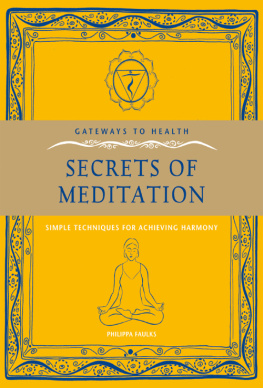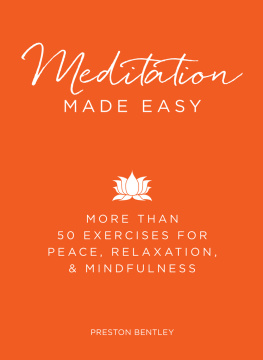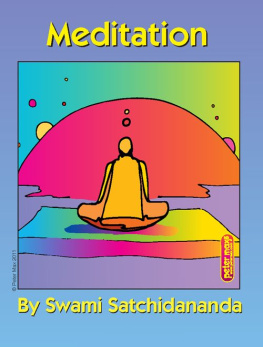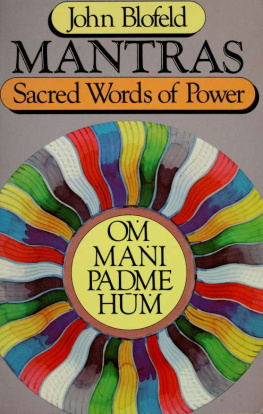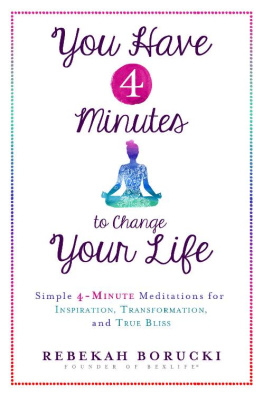Vishnudevananda - Meditation & Mantras
Here you can read online Vishnudevananda - Meditation & Mantras full text of the book (entire story) in english for free. Download pdf and epub, get meaning, cover and reviews about this ebook. year: 2013;2014, publisher: Penguin Books India Pvt Ltd, genre: Religion. Description of the work, (preface) as well as reviews are available. Best literature library LitArk.com created for fans of good reading and offers a wide selection of genres:
Romance novel
Science fiction
Adventure
Detective
Science
History
Home and family
Prose
Art
Politics
Computer
Non-fiction
Religion
Business
Children
Humor
Choose a favorite category and find really read worthwhile books. Enjoy immersion in the world of imagination, feel the emotions of the characters or learn something new for yourself, make an fascinating discovery.

- Book:Meditation & Mantras
- Author:
- Publisher:Penguin Books India Pvt Ltd
- Genre:
- Year:2013;2014
- Rating:5 / 5
- Favourites:Add to favourites
- Your mark:
- 100
- 1
- 2
- 3
- 4
- 5
Meditation & Mantras: summary, description and annotation
We offer to read an annotation, description, summary or preface (depends on what the author of the book "Meditation & Mantras" wrote himself). If you haven't found the necessary information about the book — write in the comments, we will try to find it.
Meditation & Mantras — read online for free the complete book (whole text) full work
Below is the text of the book, divided by pages. System saving the place of the last page read, allows you to conveniently read the book "Meditation & Mantras" online for free, without having to search again every time where you left off. Put a bookmark, and you can go to the page where you finished reading at any time.
Font size:
Interval:
Bookmark:


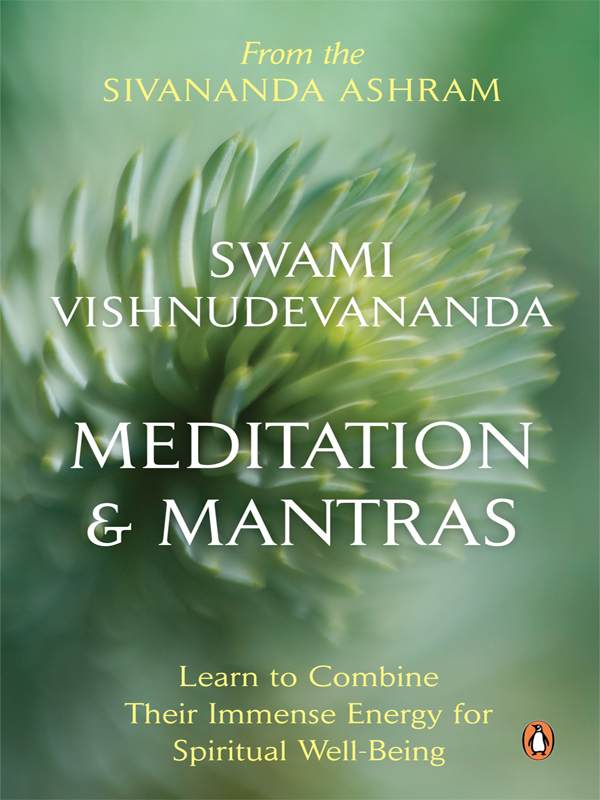

My Revered Master
H.H. SRI SWAMI SIVANANDA MAHARAJ
MY VENERABLE GURUBHAIS
Swami Paramananda
Swami Swarupananda
Swami Atmananda
Swami Narayanananda
Swami Chidananda
Swami Krishnananda
Swami Saswadananda
Swami Poorna Bhodh
Swami Visweswarananda
Swami Chinmayananda
Swami Satyananda
Swami Satchidananda (I)
Swami Sahajananda
Swami Purushottamananda
Swami Brahmananda
Swami Vasudevananda
Swami Nijabodhananda
Swami Satchidananda (II)
Swami Nirmalananda
Swami Omkarananda
Swami Harisaranananda
Swami Govindananda
Swami Madhavananda
Swami Sivananda Hridayananda
Swami Vidyananda
Swami Nadabrahmananda
Swami Venkatesananda
Swami Sivapremananda
Swami Chaitanyananda
Swami Dayananda
Swami Nityananda
Swami Saradananda
Swami Sadasivananda
Swami Tejomayananda
Swami Pranavananda
Swami Sadananda
Swami Janananda
Swami Raghavananda
Swami Ramananda
Swami Hari Omananda
Swami Premananda (Senior)
Swami Mounananda
Swami Sudhananda
Swami Sraddhananda
Swami Jyotirmayananda
And to my revered poorvashram mother and father,
SWAMI SIVASARANANANDA (P. Devaki Amma)
and P. CHATHU PANIKKER
PENGUIN ANANDA
Swami Vishnudevananda (19271993), a disciple of Swami Sivananda, was the founder of the International Sivananda Yoga Vedanta Centres. He established the Sivananda Yoga Teachers Training Course, a unique program that allowed the trainees to incorporate the teachings of yoga into their daily lives. His book The Complete Illustrated Book of Yoga is considered to be the bible for yoga practitioners.
Swami Vishnudevananda was a Karma Yogi and a peace activist who flew on several peace missions over places of conflict, bombarding war-torn areas with flowers and pamphlets while repeating the peace Mantra: Om Namo Narayanaya.He created the Om Namo Narayanaya bank in the Himalayas, hoping to bring positive vibrations to the whole world. Although he left his body on 9 November 1993, his legacy and energy still shine throughout the organization, the centres and ashrams of which have spread all over the world, training over 30,000 teachers.
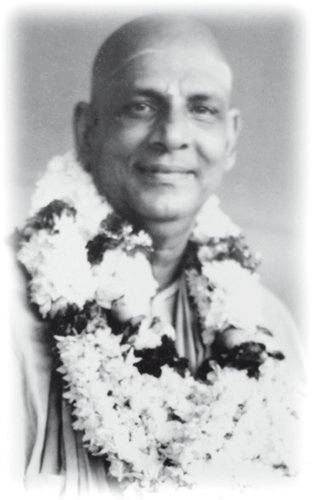
I n 1957 Swami Vishnudevananda set out from the foothills of the Himalayas to carry out the bidding of his Guru, H.H. Sri Swami Sivanandaji Maharaj. His instructions were: Spread the seeds of Yoga in the West. For thirty-seven years, Swami Vishnu worked tirelessly as an active and dedicated spiritual teacher. He traveled around the world many times teaching Yoga and establishing Centers and Ashrams where his Masters work could be carried out.
Swami Vishnudevananda was born in the south Indian state of Kerala on 31 December 1927. After completing school he entered the Engineering Corps of the Indian Army. It was while he was in the army that he first met his Guru, Swami Sivananda, one of the great saints of modern times. After being discharged from the army, Swamy Kuttan Nair, as he was then known, taught in a school in his native Kerala for a short while, before entering the Sivananda Ashram in Rishikesh in 1947. Within a year, he had renounced all things of the world and embraced a life of Sannyas on the auspicious night of MahaSivaratri. At that time he was given the name of Swami Vishnudevananda.
Remaining at the Ashram for ten years, Swami Vishnu was the first professor of Hatha Yoga at the Yoga Vedanta Forest Academy. He held a number of other positions at the Ashram, including acting as personal secretary to his Master, Swami Sivananda.
Upon leaving India for the West, Swami Vishnudevananda spent a year traveling, lecturing and teaching Yoga in Sri Lanka, Singapore, Hong Kong, Indonesia, Australia and Hawaii. Arriving in San Fancisco in 1957, Swamiji taught himself to drive and spent the next year driving throughout North America, studying the lifestyles of its people.
It soon became apparent that westerners were so caught up in the whirlwind of their lives that they neither knew how to relax nor how to lead healthy lives. Swamiji devised the concept of the Yoga Vacation and set about establishing places where people could have a complete rest of body, mind and spirit. Several Sivananda Ashrams were established based on the five principles of Yoga:
Proper Exercise (Asanas)
Proper Breathing (Pranayama)
Proper Relaxation (Savasan)
Proper Diet (Vegetarian)
Positive Thinking and Meditation (Vedanta and Dhyana)
Within a few years, the Sivananda Yoga Vedanta Centers and Ashrams had been established. This is now an international network located in major cities around the world and six Ashrams, or retreat places, where people can find peace and quiet away from the tensions and anxieties of everyday life.
In 1969 the True World Order was established. It grew from a vision which Swamiji had. He saw hundreds and thousands of people tearing down the walls and boundaries that separate nation from nation, and man from man. The purpose of this organisation is to establish unity and understanding between peoples of the world. A unique Yoga Teachers Training Course is offered with the aim of bringing harmony in the world by training its future leaders in the basics of Yoga discipline. Over the years, thousands of people from around the world have taken the course.
In 1971 Swami Vishnudevananda made headlines by flying around the world in his Piper Apache plane, painted by the American artist Peter Max. He bombed the trouble spots with flowers and leaflets of peace. At that time he braved a flight from Tel Aviv to Cairo, flying directly over the Suez Canal (which was closed). Although he and his Jewish co-pilot were almost shot down, they made the effort in the name of peace.
Swami Vishnudevananda marched through the streets of Belfast with actor Peter Sellars, chanting and praying for peace. In 1983 he flew an ultralight plane over the Berlin Wall in a bid to call the attention of Mankind to the need to break down all man-made boundaries. He sponsored numerous festivals, conferences, symposiums and world toursall calling for peace and understanding.
In addition to being a tireless worker for world peace and an inspiring teacher, Swami Vishnudevananda is well known for his outstanding work The Complete Illustrated Book of Yoga, often referred to as the Bible of the Yogis. Swami Vishnudevananda attained Mahasamadhi on 9 November 1993.
T his volume is intended to dispel the cloud of confusion that has accumulated around the subject of meditation. Those who are looking for secret shortcuts, novel innovations, exciting new trends and fads in the area of self-development may be disappointed. The methods presented here stem from the classicfour paths of Raja Yoga, Karma Yoga, Jnana Yoga and Bhakti Yoga. These are given in their uncorrupted form, yet with consideration for the Western mind and scientific tradition.
Font size:
Interval:
Bookmark:
Similar books «Meditation & Mantras»
Look at similar books to Meditation & Mantras. We have selected literature similar in name and meaning in the hope of providing readers with more options to find new, interesting, not yet read works.
Discussion, reviews of the book Meditation & Mantras and just readers' own opinions. Leave your comments, write what you think about the work, its meaning or the main characters. Specify what exactly you liked and what you didn't like, and why you think so.


